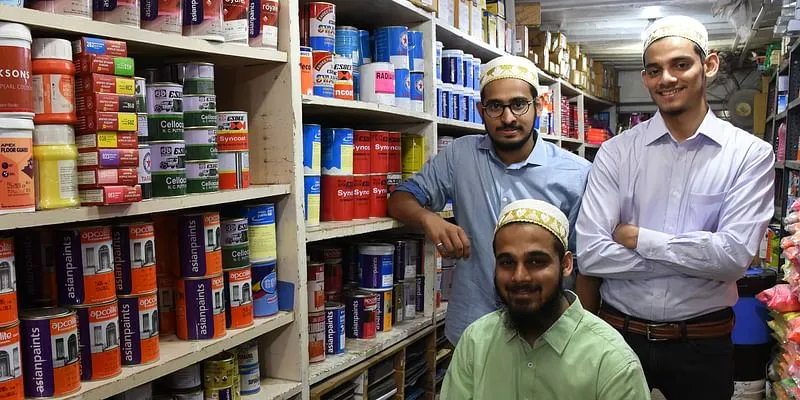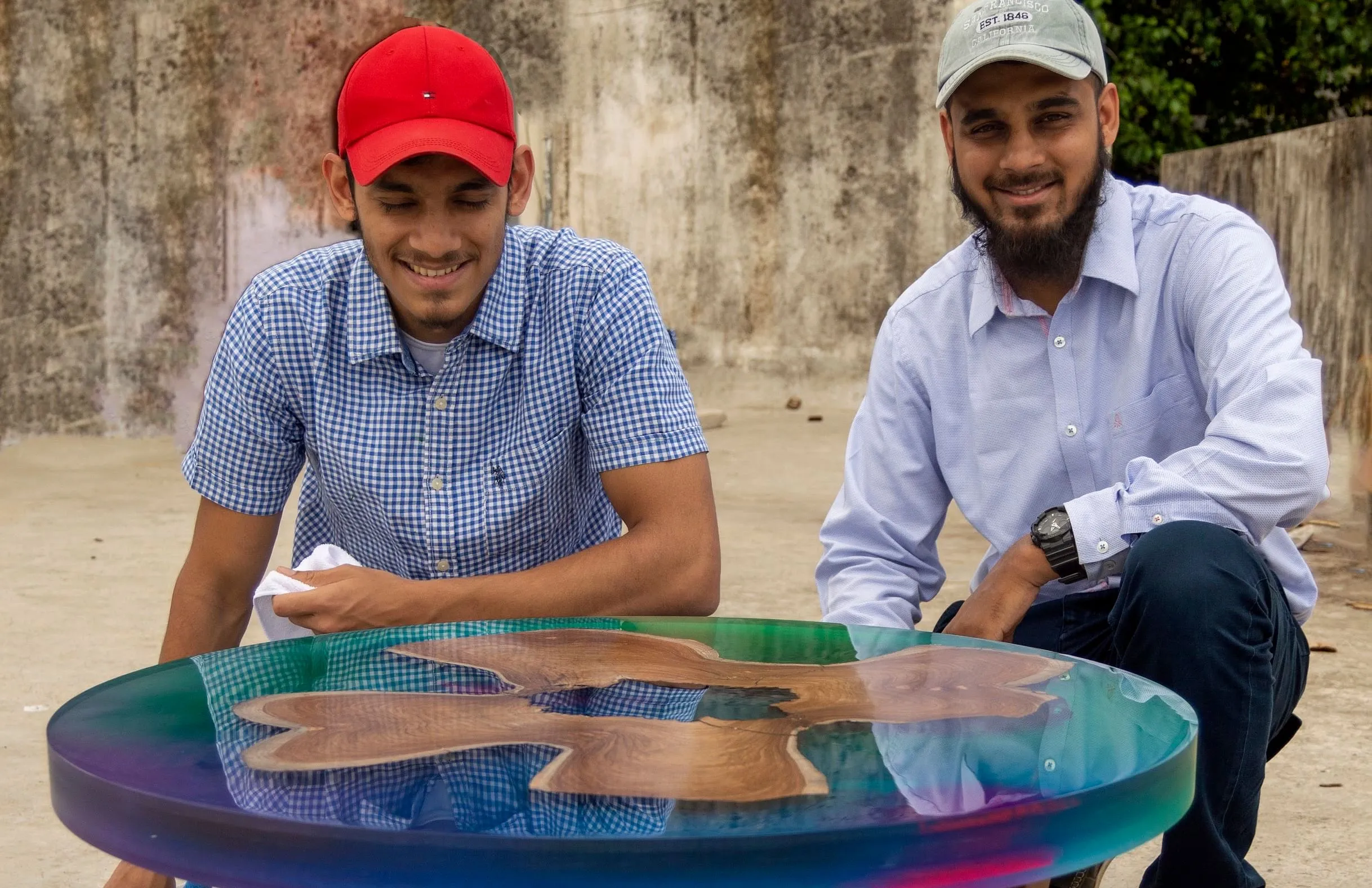How this ecommerce startup is taking Pune’s famous Bohri Ali lane online
BohriAli is an ecommerce platform that brings together the vendors, retailers, wholesalers, and traders from the congested lanes of Pune’s famous Bohri Ali street.

The BohriAli team
Ask any Punekar and they will tell you everything that you need to about Ravivar Peth’s lane. Dating back to the late 18th century, the congested yet famous Bohri Ali lane is known for its paints, hardware supplies, home decor, and antiques — sold at wholesale prices.
Yusuf’s family business AA Hakim has called Bohri Ali lane home for the last 135 years, and deals with all types of paint and coating products.
“Since childhood, we used to visit the shop and were fascinated by the people who frequented the shop and the wide variety of applications that the products were used for. There were school teachers, artists, professionals, dyers, industrialists, painters, house owners – basically, people from all walks of life. When they visited our stores, my dad or my uncle would ask them a few questions on the work they wanted to do and based on that, they would suggest the correct product or route to take to get the desired outcome,” Yusuf tells YourStory.
The familiarity and old-world charm of giving over-the-counter advise to customers looking to get a household fix is what made Bohri Ali lane special. Its bylanes and gullies are lined with wholesalers and retailers selling almost all kinds of products and at reasonable prices.
That’s why when Yusuf decided to set up an ecommerce marketplace to bring the vendors under one roof, he gave an eponymous name to the website. According to him, BohriAli.com is an ode to vendors and artisans who have worked in the lane. It is an online megastore that specialises in epoxy resins, art supplies, DIY projects, and furniture.
Setting up the platform
In 2014, Yusuf was inspired by the ecommerce wave taking over the country. While the bylanes of Bohri Ali have always remained congested and packed with customers, he felt that he could give the traders more access to the increasingly digital customer base and help them diversify.
With the help of a few friends and freelancers, the team set up the initial website. Since they were already a part of Bohri Ali lane, onboarding merchants wasn’t a challenge.
Today, despite the lockdown and containment restrictions, the website thrives and has also evolved from being just an ecommerce platform to a community of artists and doers across the country.
Yusuf explains that BohriAli is a platform where one can learn how to do complex projects through tutorials and specialised workshops. The startup also specialises in producing one-of-a-kind luxury resin furniture.
“We were able to do this because we decided to focus on a few core areas rather than become universal with the products available on the website. Narrowing up has helped us create a deep relationship with our customers, establish a community, and create content that solves problems. Social media platforms like Instagram and YouTube are an opportunity for us to inspire others with how we use the products on our website, and in turn, artists use the platform to spread awareness about their work,” says Yusuf.
Working around the challenges
However, when Yusuf and his cousins – Huzefa, Burhanuddin, and Yusuf Hakim — started BohriAli, they had to tackle a number of roadblocks. Digitisation wasn’t easy as most of the Bohri Ali lane products weren’t ecommerce friendly.
Many of the products were liquids and at that time, Yusuf says no courier company wanted to get into the complexity of handling liquid deliveries. Surely but steadily, they were able to narrow down the target audience and reach out to thousands of people across the country. The brand started using its own products and this experience helped the team answer technical questions that came up from the community.
“We strongly focused on original content and building the community, which eventually helped us to create a niche for ourselves. We now conduct a one-of-a-kind two-day Resin River Table workshop. Our passionate participants travel from across the country to attend these workshops. People come from all parts of Maharashtra, Kerala, Delhi, and almost every state in India. Some participants even come from the Middle East,” he adds.
As they explored and answered queries related to resin art and resin woodwork, they started getting enquiries and orders to make the river tables and furniture using resin and wood.
This was extremely challenging—both technically and commercially—to produce and deliver. After some research, the team set up a specialised wood and resin manufacturing unit to manufacture the luxury river table.

BohriAli workshops
Focusing on artisans
A team of 15, BohriAli comprises both permanent and part-time employees.
“Our fathers operate and sit in the same shop, and it was easy to find the focus area of the business. It was quite hard to find people who believed in the concept because they had never seen Bohri Ali lane as we had. For them, it was just a bunch of congested gullies packed with shops. Eventually, we found two employees who were the first to join the startup and are still working with us,” says Yusuf.
The platform now employs in-house furniture designers, artisans, business development executives, and resin artists, as well as use the services of architects, videographers and experienced resin artists—who are also their customers—to fulfil their orders and carry out their activities.
Currently bootstrapped, BohriAli is run as a part of the family business. “Having started with a very small capital of a few lakh rupees, we have been able to grow the revenue to almost 200 times. Growth has been between 50-100 percent year-on-year,” explains Yusuf.
Market and future
The unit economics of the startup varies from product to product. It is a trading platform where products are sold at very competitive prices. The luxury furniture line is also currently being promoted by the team to spread awareness.
According to IndianRetailer.com, the gifting and niche ecommerce market in India is pegged at $30 billion, of which $400 million can be attributed to the digital space. The marketplace is growing with startups like Zwende, Tjori, Okhai, Brown Living, and many others that offer different of niche products and services.
“We are soon moving into a specialised factory for luxury furniture in Pune. We are also opening up a floor of our office to conduct the specialised one-of-a-kind workshops. And the ecommerce model is always scaling up with more products, more clients and more locations to be serviced,” adds Yusuf.
Edited by Kanishk Singh










